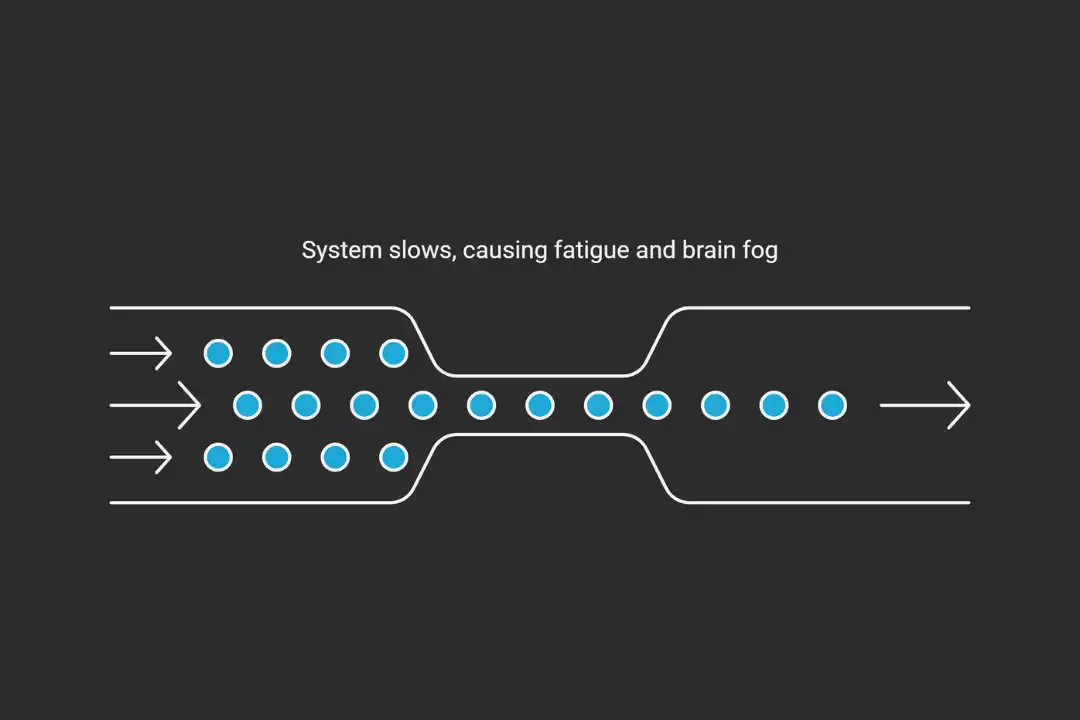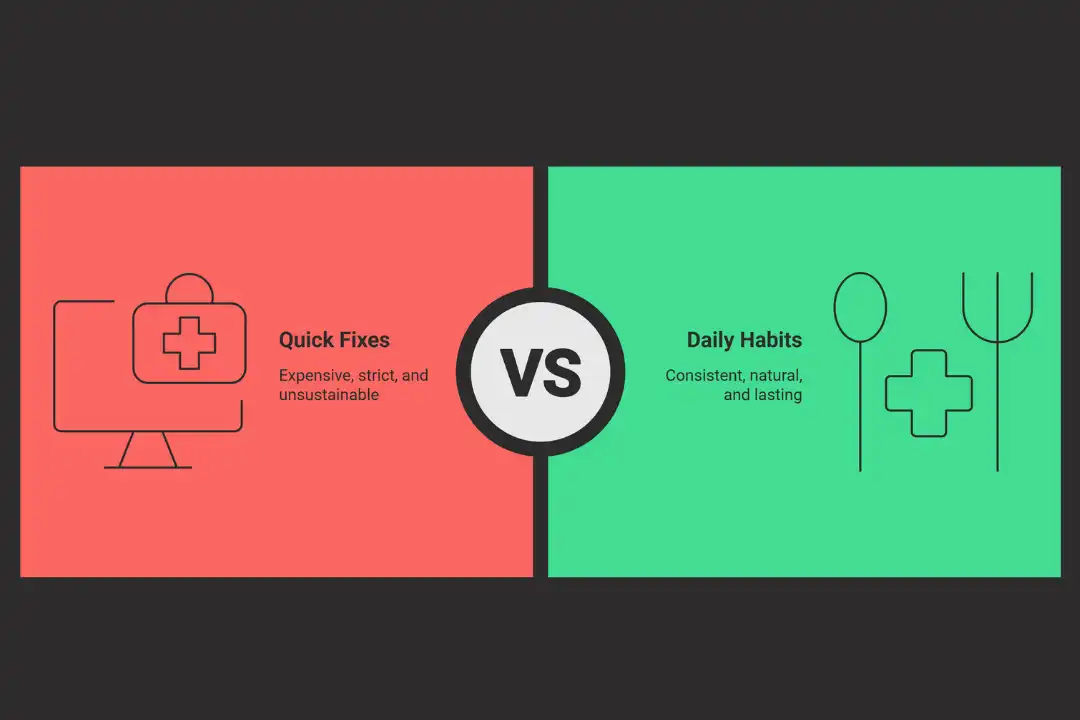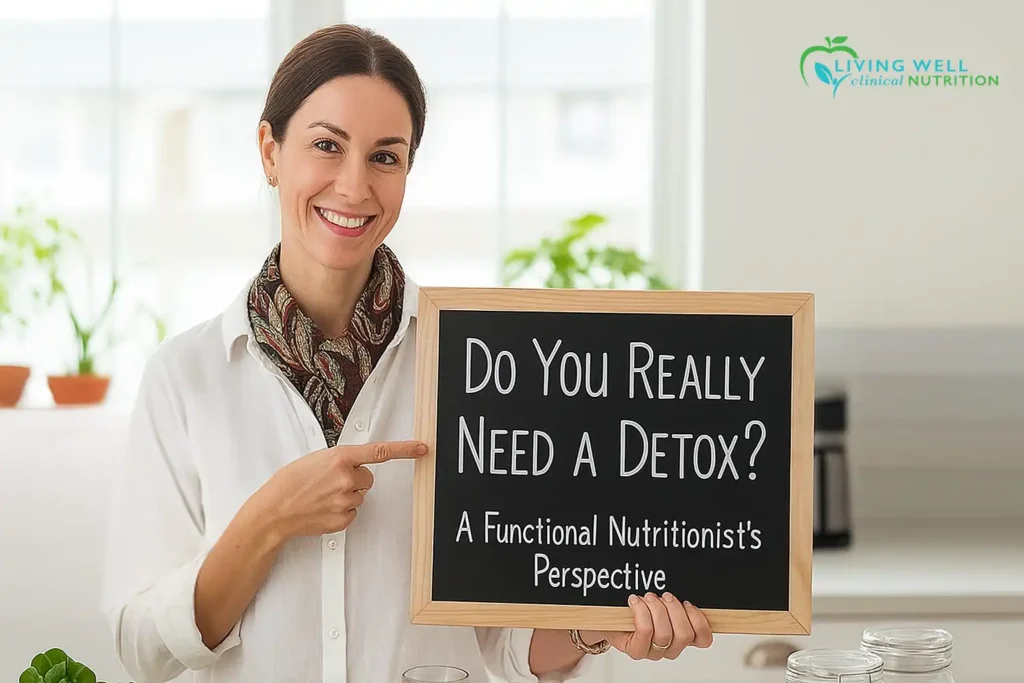Sometimes it feels like everyone’s talking about detoxing, your friends, social media, and even that new juice bar down the street. You see promises of “instant energy,” “clear skin,” and “total body reset,” but deep down, you might wonder if all that’s really necessary. I get it, my friend, I’ve had clients walk into my office holding bags of supplements, unsure where to start or if they even need to. So, let’s clear the air once and for all.
detox programs
The truth is, your body already has its own detox system; your liver, kidneys, lungs, and skin work around the clock to remove toxins. The problem isn’t that your body “forgets” how to detox; it’s that modern life sometimes overwhelms those natural pathways. That’s where smart, nutrition-based support can make a real difference , not through harsh cleanses, but through everyday nourishment that helps your body do what it’s built to do.
What “Detox” Really Means, and What It Doesn’t
Let’s start by getting honest about what detox actually means. Somewhere along the way, the word got hijacked by marketing. Now it’s slapped on everything from teas to foot pads. But in functional nutrition, detox isn’t a trendy cleanse; it’s a biological process your body does naturally every single day.
Your liver, kidneys, skin, lungs, and even your gut all play key roles in filtering out waste and converting toxins into forms your body can safely eliminate. When people talk about “doing a detox,” what they often mean (or should mean) is supporting those organs so they can do their job more effectively, not starving your body or flushing it out with endless juices. According to the National Center for Complementary and Integrative Health (NCCIH), the body naturally eliminates toxins through organs like the liver, kidneys, and skin, and there’s limited evidence that commercial detox programs enhance this process.
I remember one client, a young teacher who came to me feeling drained and foggy after trying a seven-day “detox challenge” she saw online. She’d cut out almost everything but green juices and a few supplements. By day four, she could barely focus in class and ended up feeling worse than when she started. When we worked together, we shifted her focus from “flushing out toxins” to nourishing her detox organs. Within two weeks of eating balanced meals, with enough protein, hydration, and whole foods, she said, “I didn’t realize detox could mean feeling full and energized!” That, to me, is what real detox support looks like.
A true detox approach is about balance, not deprivation. It means giving your body what it needs , nutrients, rest, hydration, and movement, so it can do its job better. No fancy powders, no extreme plans. Just science, self-care, and steady support.
When Your Body May Actually Need Support

Subtle Signs of Overload
You don’t always see dramatic symptoms when your detox system struggles. Often, it’s the little things: waking up tired even after a full night’s sleep, struggling to focus, or noticing your skin looks dull. Some people feel bloated or have irregular digestion. Others deal with frequent headaches or mild joint stiffness that just won’t go away.
When I work with clients, I often hear them say, “I’m doing everything right , eating clean, exercising, sleeping , but I still don’t feel my best.” What’s happening is that their liver and gut might not be processing waste efficiently. That backup can create inflammation, hormonal imbalance, and fatigue over time. The goal isn’t to “detox harder” , it’s to help those systems function smoothly again.
Why Modern Life Makes Detox Harder
Today’s environment makes it tough for the body to keep up. Processed foods, air pollutants, chemical cleaners, alcohol, and even chronic stress all add up. Our bodies were designed to handle natural toxins from food and the environment, not the synthetic load we face every day. Stress alone can impair detoxification because it diverts energy away from digestion and repair.
Then there’s the issue of nutrient depletion. Many people eat fewer whole foods and more convenience items, which means they lack the vitamins and minerals needed for detox pathways, especially B vitamins, magnesium, zinc, and antioxidants. Without those, your liver can’t perform key reactions to neutralize toxins. Supporting your detox system starts with refueling it properly, not restricting it.
The Role of the Gut in Detox Support
One of the most overlooked parts of detoxification is the gut microbiome. Your gut bacteria help process and eliminate waste through the stool. If your digestion is sluggish or you’re constipated, toxins that should leave your body can actually recirculate. That’s why fiber, hydration, and balanced gut bacteria are essential. A functional nutritionist often checks for signs of gut imbalance, like bloating, irregular bowel movements, or cravings for sugar.
Balancing the gut doesn’t mean taking random probiotics; it means feeding the bacteria that already help you. Think colorful vegetables, fermented foods like sauerkraut, and fiber-rich grains. When your gut works well, your whole detox system benefits.
Supporting, Not Forcing, Detox
A common mistake people make is thinking that detoxing means pushing the body to release everything fast. That’s why many feel awful during harsh cleanses, such as headaches, fatigue, or even nausea. What’s really happening is that the liver is releasing toxins faster than the body can eliminate them. A well-planned detox supports both phases of liver detoxification: neutralizing harmful substances and excreting them safely.
This is where a functional nutrition approach comes in. Instead of short-term cleanses, it uses food, hydration, and lifestyle habits to strengthen the body’s natural systems. When you support detox gently, you don’t feel deprived; you feel clearer, lighter, and more balanced.
Listening to Your Body’s Cues
Your body gives you feedback every day. Feeling sluggish after certain foods, breaking out when you’re stressed, or waking up tired despite a good night’s rest are all gentle reminders that your internal systems could use a tune-up. Supporting detox isn’t about “resetting” your body; it’s about listening to it and responding wisely.
In my experience, the best detoxes don’t involve extremes. They involve trust, trusting your body’s natural design, and giving it what it needs to function at its best. When you eat clean, move your body, manage stress, and sleep deeply, you are already detoxing, and no expensive kit is required.
A detox done right doesn’t feel like punishment. It feels like coming back into balance.
When Detoxes Go Too Far: What the Research Says
The idea of detoxing sounds refreshing. Who wouldn’t want to “start fresh”? But the truth is, many detox trends today push your body harder than it’s meant to go. Research from the National Center for Complementary and Integrative Health (NCCIH) and UCLA Health shows that extreme or unbalanced detox programs can do more harm than good. They often promise instant results but leave you depleted instead of renewed.
What Science Says About Detox Fads
Studies show that most commercial detox diets or cleanses don’t have long-term scientific support. While you may lose weight quickly, that’s usually water and muscle, not fat. When you return to regular eating, the weight often comes back, sometimes with added fatigue and nutrient loss. The body doesn’t need to be “flushed out”; it needs steady, daily support.
Common risks of overdoing detox programs include:
- Nutrient Deficiency: Cutting too many calories or food groups leads to low vitamins and minerals.
- Muscle Loss: Extreme fasting burns muscle for energy, slowing your metabolism.
- Dehydration: Laxative-based detoxes and colon cleanses can cause fluid loss and electrolyte imbalance.
- Blood Sugar Imbalance: Juicing or skipping meals can cause unstable blood sugar levels.
- Digestive Distress: Quick cleanses can disrupt the gut microbiome, leading to bloating or constipation afterward.
Comparing Real vs. Risky Detox Approaches
| Approach Type | What It Involves | Potential Benefits | Common Risks |
| Juice Cleanse | Drinking only fruit or vegetable juices for several days | Short-term hydration, more vitamins | Low protein, fatigue, rebound hunger |
| Fasting Detox | Limiting or skipping meals for extended periods | May help insulin sensitivity (short-term) | Dizziness, irritability, loss of muscle mass |
| Supplement-Based Detox | Using herbal pills, teas, or powders | Convenience, targeted nutrients (sometimes) | Unregulated ingredients, liver stress |
| Food-Based Detox (Functional Nutrition) | Whole foods, hydration, rest, and lifestyle balance | Sustainable, safe, supports natural detox organs | Requires consistency and guidance |
This table makes one thing clear: the safest detox is the one that works with your body, not against it.
Why Supervised Detox Matters
A functional nutritionist helps you avoid extremes by personalizing your plan. Instead of focusing on “cleansing,” we look at supporting, balancing blood sugar, optimizing digestion, and replenishing nutrients. Everybody is different. That’s why the best detox isn’t a one-size-fits-all solution but a guided, gradual reset that fits your lifestyle.
When you support your body gently, you’ll notice the difference: better energy, calmer digestion, and a more stable mood, without the crash or cravings. That’s what safe, smart detoxing looks like.
How to Detox Safely, With a Functional Nutritionist’s Guidance
The safest and most effective detox isn’t about restriction, it’s about restoring balance. A functional nutritionist looks at your body as a whole, not just what you eat or drink. They use science and practical guidance to design detox support that feels gentle, sustainable, and personal to your needs.
The Power of a Personalized Plan
A nutritionist never starts with a one-size-fits-all approach. Instead, they look at your lifestyle, lab results, and symptoms to see where your detox pathways might be struggling. For example, someone with sluggish digestion might need more fiber and hydration, while another person with a hormone imbalance may need extra liver support.
Personalized detox plans often include:
- Balanced meals: Real foods with the right mix of protein, healthy fats, and fiber.
- Hydration strategy: Water, herbal teas, and electrolytes to help flush waste naturally.
- Rest and recovery: Sleep and stress management to support liver and adrenal health.
- Targeted supplements: Only when testing shows a true need (like glutathione or magnesium).
A nutritionist will also track how your body responds and make adjustments to keep things balanced, no guesswork, no extremes.
Functional Lab Insight
What sets a functional detox apart is the use of lab testing to guide the process. These labs might assess liver enzymes, gut bacteria balance, or inflammation markers. With this data, a nutritionist can create a detox that works with your body’s unique rhythm.
For instance, if your liver enzymes are slightly elevated or you show signs of poor digestion, your plan might emphasize foods that support liver function, like cruciferous vegetables, citrus, and lean proteins. Testing removes the uncertainty that comes from generic “detox kits” and replaces it with precision.
Gentle Reset, Not a Race
A healthy detox isn’t about how fast you can “clean out” your system. It’s about restoring natural flow , eating enough, sleeping well, and giving your organs space to recover. Think of it as pressing “refresh” on your body, not hitting “restart.”
Your body already knows how to detox. A functional nutritionist simply helps it do that better , by providing the right foods, nutrients, and lifestyle support. That’s why people who detox with guidance feel steady energy and clarity, instead of hunger or exhaustion.
Safe detoxing is never about perfection; it’s about partnership between your body and your nutritionist. That’s where true healing begins.
Everyday Habits That Naturally Support Detox
Supporting detox doesn’t require a special diet, an expensive kit, or strict rules. What your body truly needs is consistency, the kind of daily habits that keep your natural detox pathways open and working smoothly. These are the quiet, powerful steps that create lasting health, not overnight change.

Nourish Your Body with Whole Foods
The best detox foods aren’t exotic powders or fancy blends; they’re the colorful, natural foods found at any market. Your liver thrives on nutrients like sulfur (from garlic, onions, and eggs) and antioxidants (from berries, greens, and citrus). When you eat a mix of these daily, your body’s detox system runs more efficiently.
Another simple yet powerful habit is eating enough fiber. Fiber binds to toxins and waste in the gut and helps move them out of the body. Without it, the toxins your liver processes can reabsorb into your system. Whole grains, beans, vegetables, and fruits are gentle ways to make sure your digestion stays regular and clean.
Hydration: The Simplest Detox Tool
You’ve probably heard that water helps flush toxins , and that’s completely true. But detoxing isn’t about drowning yourself in gallons of water; it’s about steady hydration throughout the day. Water helps the kidneys filter waste, supports digestion, and maintains energy levels. Add lemon, cucumber, or mint if plain water feels boring , small changes keep you consistent.
When I work with clients who feel “stuck” or sluggish, one of the first questions I ask is about their hydration. Often, they’re drinking less than half of what their body needs. Once we fix that, their digestion improves, their skin clears, and their focus sharpens, no supplements required.
Movement and Mindfulness
Your lymphatic system, which helps remove cellular waste, doesn’t have a pump like your heart. It relies on movement. Even light activities like walking, stretching, or yoga can stimulate lymph flow and improve detox efficiency. Regular movement also helps your liver and gut stay active and balanced.
Mindfulness plays an unexpected role in detox, too. Stress creates a cascade of hormones that can slow digestion and burden your liver. Taking time to breathe deeply, rest, or spend time in nature gives your body space to recover.
Supporting your body daily is what keeps it clean, strong, and steady. The best detox isn’t something you “start” and “finish”, it’s something you live, one mindful habit at a time.
Final Thoughts: You Don’t Need to “Fix” Your Body, You Need to Support It
Your body isn’t broken or dirty; it’s designed to heal and renew itself when given the right care. The key to detox isn’t harsh restriction or trendy cleanses; it’s trusting your body’s wisdom and supporting it with real food, rest, movement, and mindfulness.
A nutrition-based detox done with guidance helps you feel lighter, clearer, and more energized, not because it forces change, but because it restores your natural balance. So instead of chasing quick fixes, focus on gentle, consistent care. That’s where real wellness begins.
Ready to Feel Your Best Again?
Stop guessing and start supporting your body the right way. At Just Live Well, our functional nutritionists craft personalized, science-based detox programs, no harsh cleanses, no quick fixes, just real results.
Frequently Asked Questions About Detox
Do I need to detox even if I eat healthy?
If you already eat clean, move often, and sleep well, your body likely manages detox just fine. However, gentle support through hydration, fiber, and nutrient-rich foods can help keep your liver and gut functioning smoothly. Think of it as maintenance, not repair.
Are detox teas and supplements safe?
Most detox teas and supplements are not regulated and can vary in quality. Some may contain laxatives or unlisted ingredients that strain your liver or kidneys. It’s best to talk with a functional nutritionist before using any supplement-based detox product.
How long should a detox last?
A real, food-based detox isn’t about a set timeframe; it’s a daily lifestyle. However, guided programs that focus on nutrient restoration and gentle cleansing can last anywhere from 7 to 21 days, depending on your health and goals.
Can detoxing help with weight loss?
Weight loss during detox usually comes from reduced water retention and inflammation, not fat loss. The true benefit of a detox is helping your body work more efficiently. Over time, that balance naturally supports a healthier metabolism.
What should I eat during a safe detox?
Focus on whole, unprocessed foods, lots of vegetables, fruits, lean proteins, and healthy fats. Avoid added sugars, alcohol, and refined foods that overload your system. Hydrate well and eat regularly; starving yourself slows detox, it doesn’t speed it up.


